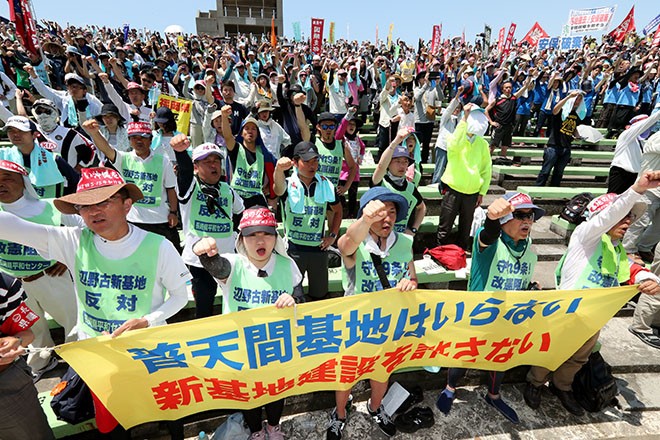In 1995, I saw for the first time what a blazing conflagration, feeding on popular outrage, could look like.
The scene was televised from the city of Ginowan in Okinawa Prefecture, where 85,000 citizens packed a field to protest the gang rape of a local schoolgirl by U.S. servicemen.
Until then, I had always thought of Okinawans as mild-mannered and soft-spoken. But seeing for the first time how intense they could be, I could not take my eyes off the TV screen.
Some demonstrators raised placards in the Okinawan dialect that read, “Nijitin nijiraran” (We cannot bear this anymore).
Seeing those words, Okinawa Governor Masahide Ota, who was to deliver a prepared speech at the rally, decided to go off the script. Putting away his notes in his pocket, he resolved to “just say what I think in my own words.”
He asserted powerfully to the effect: “So far, Okinawa has always cooperated with Tokyo and Washington. But now it is their turn to cooperate with Okinawa.”
That was on Oct. 21, exactly 30 years ago.
Both Ota and then-Prime Minister Tomiichi Murayama are already deceased, and the clock keeps ticking inexorably.
But the resolution to “review the Japan-U.S. Status of Forces Agreement,” adopted at the rally, has not materialized even under Prime Minister Shigeru Ishiba who is pro-review.
As for the other resolution to “downscale U.S. bases,” everything has moved so slowly that whatever downscaling has been achieved is being overshadowed by the growing influence and presence of the Self-Defense Forces in Okinawa.
The problem, as pointed out by Ota in his book, is “the fact that the idea of turning Okinawa once again into the stronghold of national defense is now being realized.“
His words weigh heavily today.
What is Okinawa to Japan? What course is the Japanese government setting for Okinawa, and where does it want Okinawa to go?
I am reminded of a poem by Kenichiro Yara, an Okinawan poet. It goes to the effect: “Feeling my way around with my hand on the fence/ This island feels like a mirror house with no exit.”
—The Asahi Shimbun, Oct. 21
* * *
Vox Populi, Vox Dei is a popular daily column that takes up a wide range of topics, including culture, arts and social trends and developments. Written by veteran Asahi Shimbun writers, the column provides useful perspectives on and insights into contemporary Japan and its culture.


AloJapan.com